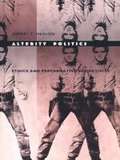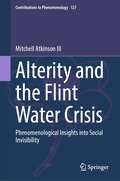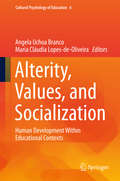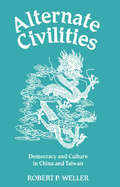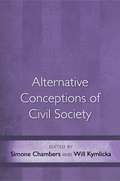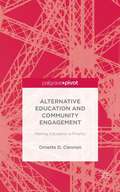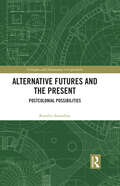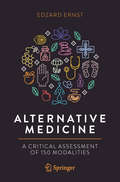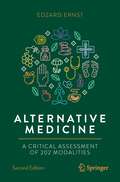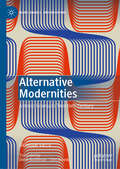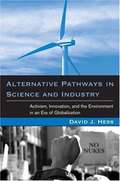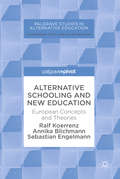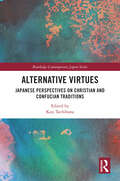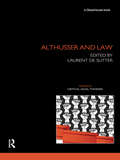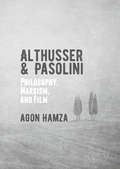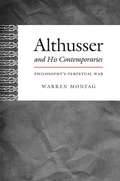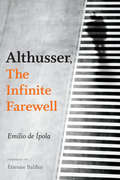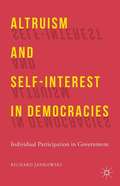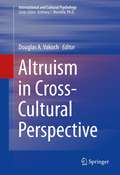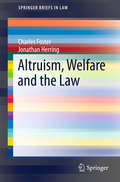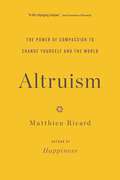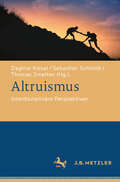- Table View
- List View
Alterity Politics: Ethics and Performative Subjectivity
by Jeffrey NealonIn conventional identity politics subjective differences are understood negatively, as gaps to be overcome, as lacks of sameness, as evidence of failed or incomplete unity. In Alterity Politics Jeffrey T. Nealon argues instead for a concrete and ethical understanding of community, one that requires response, action, and performance instead of passive resentment and unproductive mourning for a whole that cannot be attained.While discussing the work of others who have refused to thematize difference in terms of the possibility or impossibility of sameness--Levinas, Butler, Derrida, Foucault, Deleuze, Guattari, Zizek, Jameson, Heidegger, Bakhtin--Nealon argues that ethics is constituted as inexorable affirmative response to different identities, not through an inability to understand or totalize the other. Alterity Politics combines this theoretical itinerary with crucial discussions of specific and diverse sites of literary and cultural production--the work of William S. Burroughs, Amiri Baraka, Andy Warhol, Ishmael Reed, Rush Limbaugh, and Vincent Van Gogh--along with analyses of the social formation of subjects as found in identity politics, and in multicultural and whiteness studies. In the process, Nealon takes on a wide variety of issues including white male anger, the ethical questions raised by drug addiction, the nature of literary meaning, and the concept of "becoming-black."In seeking to build an ethical structure around poststructuralist discourse and to revitalize the applied use of theoretical concepts to notions of performative identity, Alterity Politics marks a decisive intervention in literary theory, cultural studies, twentieth-century philosophy, and performance studies.
Alterity and the Flint Water Crisis: Phenomenological Insights into Social Invisibility (Contributions to Phenomenology #127)
by Mitchell Atkinson IIIThis text develops a novel methodology for social investigation into the Flint (Michigan, USA) water crisis by using classical Husserlian phenomenology as its point of departure. To develop a proper method in a case like this, the author uses as primary data the experiences of the affected community. The text investigates philosophically how a water crisis happens as well as the structures of power responsible. This book grounds contemporary theories of power in a phenomenology of social experience. Key to that grounding is the careful elaboration of subject positions in power structures as partially constitutive of lifeworlds (lebensumwelten) for consciousness. The applied phenomenological tools unravel the central enigma of how a community’s concerns and the dictates of power can become so disastrously estranged. This text appeals to researchers and students working not just in phenomenology and philosophy but also to those working in the field of environmental humanities and on social justice issues.
Alterity, Values, and Socialization: Human Development Within Educational Contexts (Cultural Psychology of Education #6)
by Angela Uchoa Branco Maria Cláudia Lopes-de-OliveiraThis book elaborates on issues regarding alterity, values, and human development in different educational contexts, serving from young children to adolescents to adults, and it claims for the need of educational contexts to consider their responsibilities regarding the development of the sociomoral dimension of human beings. The authors, experienced theorists and researchers sharing a cultural psychological perspective, provide a fresh understanding of educational institutions, and elaborate on how initiatives aiming at promoting dialogical practices and ethical orientation within educational contexts can be productive. They provide teachers, researchers, psychologists and parents, as well as the general public, with useful knowledge in order to contribute to theoretical and practical advances concerning education and human development.
Alternate Civilities: Democracy and Culture in China and Taiwan
by Robert P. WellerSome Asian political leaders and Western academics have recently claimed that China is unlikely to produce an open political system. This claim rests on the idea that ?Confucian cultureOCO provides an alternative to Western civil values, and that China lacked the democratic traditions and even the horizontal institutions of trust that could build a civil society. An opposed school of thought is far more optimistic about democracy, because it sees market economies of the kind China has begun to foster as pushing inexorably against authoritarian political control and reproducing Western patterns of change. "Alternate Civilities" argues for a different set of political possibilities. By comparing China with TaiwanOCOs new and vibrant democracy, it shows how democracy can grow out of Chinese cultural roots and authoritarian institutions. The business organizations, religious groups, environmental movements, and womenOCOs networks it examines do not simply reproduce Western values and institutions. These cases point to the possibility of an alternate civility, neither the stubborn remnant of an ancient authoritarian culture, nor a reflex of market economics. They are instead the active creation of new solutions to the problems of modern life. "
Alternative Ageing: How To Stay Looking and Feeling Younger For Longer
by Suzi Grant'Suzi Grant knows the secrets of youth' The TimesLOOK AND FEEL YOUR BEST IN 2020 WITH ALTERNATIVE AGEING - THE NATURAL WAY TO FEEL YOUNG AGAINSuzi Grant is in her late sixties but you wouldn't know it. Still living life to the full, she knows the secrets of looking and feeling fabulous for ever. A leading blogger and researcher into ageing, Suzi has created this easy Alternative Ageing action plan to give you more energy and vitality. Inside you'll discover:- What foods to eat and avoid- How to keep your skin glowing- How to naturally boost your hormones- Easy fitness exercises- Simple stress busters- An average alternative-ageing day Follow the tips in Alternative Ageing and you'll soon discover a new you who looks and feels great and runs rings around your children - and even grandchildren.It's time to feel young all over again.
Alternative Conceptions of Civil Society (Ethikon Series in Comparative Ethics #1)
by Simone Chambers & Will KymlickaThe idea of civil society has long been central to the Western liberal-democratic tradition, where it has been seen as a crucial site for the development and pursuit of basic liberal values such as individual freedom, social pluralism, and democratic citizenship. This book considers how a host of other ethical traditions define civil society. Unlike most studies of the subject, which focus on a particular region or tradition, it considers a range of ethical traditions rarely addressed in one volume: libertarianism, critical theory, feminism, liberal egalitarianism, natural law, Christianity, Islam, Judaism, and Confucianism. It considers the extent to which these traditions agree or disagree on how to define civil society's limits and how to evaluate its benefits and harms. <P><P>A variety of distinguished advocates and interpreters of these traditions present in-depth explorations of how these various traditions think of ethical pluralism within societies, asking how a society should respond to diversity among its members. Together they produce a work rich with original insights on a wide range of subjects about which little has been written to date. An excellent starting point for a comparative ethics of civil society, this book concludes that while the concept of civil society originated in the liberal tradition, it is quickly becoming an important focus for a truly cross-cultural dialogue. In addition to the editors, the contributors are Michael Banner, Hasan Hanafi, Loren E. Lomasky, Richard Madsen, Michael A. Mosher, Michael Pakaluk, Anne Philips, Adam B. Seligman, Suzanne Last Stone, and Michael Walzer.
Alternative Education and Community Engagement: Making Education a Priority
by Ornette D. Clennon Cassie Earl Kehinde AndrewsThis book explores the ethical and philosophical issues behind the provision of market-led alternative education. The volume examines the models of Free, Studio, Supplementary and Co-operative school provisions, asking whether a market-based approach to delivering higher standards of education actually works.
Alternative Futures and the Present: Postcolonial Possibilities (Critiques and Alternatives to Capitalism)
by Ranabir SamaddarThis book explores the idea that alternatives to our present condition are available in the present, such that a search for alternatives must involve rigorous study of some of its central texts, events, and thinkers. Through engagement with selected modern thinkers, texts, and events, it imagines a different future from the position of the current postcolonial moment, indicating the possibilities that emerge from the present and which shape contemporary radical thinking. An invitation to imagine a possible future marked with alternative possibilities of conducting struggles, and living through contentions and social restructuring, it will appeal to scholars with interests in social and political theory, political philosophy, colonialism and postcolonialism, and historical materialism.
Alternative Medicine: A Critical Assessment of 150 Modalities
by Edzard ErnstAlternative medicine (AM) is hugely popular; about 40% of the US general population have used at least one type of alternative treatment in the past year, and in Germany this figure is around 70%. The money spent on AM is considerable: the global market is expected to reach nearly US $ 200 billion by 2025, with most of these funds coming directly out of consumers’ pockets. The reasons for this popularity are complex, but misinformation is certainly a prominent factor. The media seem to have an insatiable appetite for the subject and often report uncritically on it. Misinformation about AM on the Internet (currently about 50 million websites are focused on AM) is much more the rule than the exception. Consumers are thus being bombarded with misinformation on AM, and they are ill-protected from such misinformation and therefore prone to making wrong, unwise or dangerous therapeutic decisions, endangering their health and wasting their money. This book is a reference text aimed at guiding consumers through the maze of AM. The concept of the book is straightforward. It has two main parts. The first, short section provides essential background on AM, explaining in simple terms what is (and what is not) good, reliable evidence, and addressing other relevant issues like, for instance, the placebo response, informed consent, integrative medicine, etc. The second and main part consists of 150 short chapters, topically grouped and each dedicated to one single alternative therapeutic or diagnostic method. In each of them, seven critical points are raised. These points relate to issues that are important for consumers’ decisions whether it is worth trying the method in question. Restricting the discussion to just seven points means that issues must be prioritized to those themes which are most relevant in the context of each given modality.
Alternative Medicine: A Critical Assessment of 202 Modalities (Copernicus Books)
by Edzard ErnstAlternative medicine (AM) is popular; about 40% of the US general population have used alternative treatment in the past year, and in Germany this figure is around 70%. The global market is expected to reach nearly US $ 200 billion by 2025, with most of these funds coming directly out of consumers’ pockets. Consumers are bombarded with misleading and false information on AM and therefore prone to making wrong, unwise, or dangerous therapeutic decisions, endangering their health and wasting their money. This book is a reference text aimed at guiding consumers through the maze of AM. This second edition includes over 50 additional treatments as well as updates on many others.
Alternative Modernities: Antonio Gramsci's Twentieth Century (Marx, Engels, and Marxisms)
by Giuseppe VaccaAntonio Gramsci lived the Great War as a “historic break,” a profound experience that left an indelible mark on the development of his political thought. Translated into English for the first time, Alternative Modernities reconstructs and analyses this critical period of Gramsci’s intellectual formation through a systematic analysis of his writings from 1915 to 1935. For Gramsci, Soviet Communism, “Americanism,” and the “new” Fascist State were the principle responses to the crisis of the old world order. He portrayed them as the three protagonists of twentieth-century modernity, alternatives destined to tragically clash in the worldwide struggle for hegemony. Among the arguments in his Prison Notebooks, Gramsci casts doubt on the political strategy of Soviet Communism and the theoretical underpinnings of “official Marxism.” Instead, he suggests a radical revision of Marxism by breathing life into a new interpretation whose fundamental concepts are: politics as the struggle for hegemony, the “passive revolution” as a historical paradigm of modernity, and the philosophy of praxis as the welding between visions of the worlds, historical analyses, and political strategies. Gramsci’s intuitions culminate in a new theory of the political subject, supported by a reflection upon the 20th century that still speaks to us today, pointing the way toward a new narrative of world history.
Alternative Pathways in Science and Industry: Activism, Innovation, and the Environment in an Era of Globalization
by David J. HessHess examines how social movements and other forms of activism affect innovation in science, technology, and industry. Hess explores the interaction of grassroots environmental action and mainstream industry and offers a conceptual framework for understanding it.
Alternative Schooling and New Education: European Concepts and Theories (Palgrave Studies in Alternative Education)
by Ralf Koerrenz Annika Blichmann Sebastian EngelmannThis book examines the European discussion about alternative schooling in the 20th century. It refers to a stream of concepts that are often described as New Education, Progressive Education, Education Nouvelle or Reformp#65533;dagogik, and discusses a range of different models of alternative schooling. Exploring the works of a range of continental educational philosophers, including Lietz, Blonsky, Kerschensteiner, Freinet, Decroly and Petersen, the book offers a unique insight into texts not yet translated into English. These educational models are presented with regards to the biographical background of the authors; the crucial elements of their construction; the historical interconnections between schooling, society and culture; and finally their connection to today's discussions in educational sciences. The book will be highly relevant for researchers and advanced students working on the theory, history and practice of schooling, particularly those with a focus on alternative schooling and the philosophy of education.
Alternative Virtues: Japanese Perspectives on Christian and Confucian Traditions (Routledge Contemporary Japan Series)
by Koji TachibanaIncorporating various perspectives on the Japanese notion of virtue, Alternative Virtues investigates and expands our current understanding of virtue and presents a foundational case study of an alternative approach to virtues.The study of virtue has long been dominated by Western (i.e., Christian) and far-Eastern (i.e., Confucian) points of view. However, Japanese thinkers and scholars have struggled with these traditions. The rise of cultural intermingling with these traditions has created a unique code of values in Japan, which have grown from their own historical and cultural sources other than the Christian and Confucian traditions. Viewed through the filter of Japanese history and culture as well as focusing on different contexts in Japan, the book investigates both moral and epistemic virtues. Discussing the theoretical and practical implications that such alternative virtues may have on our lives, this book will contribute to reforming the current research trends in virtue theory and encouraging the wider public to consider the notion of virtue from a fresh perspective.Due to the content and scope of the book, it will appeal to a variety of readers– both locally and internationally–interested not only in Japanese historical, cultural, and philosophical investigations of virtues but also in learning more about alternative perspectives on virtues. This readership includes scholars and university students (both undergraduate and postgraduate) in the fields of philosophy, history, cultural studies, moral psychology, and education.
Alternde Gesellschaft im Wandel: Zur Gestaltung einer Gesellschaft des langen Lebens (Schriften zu Gesundheit und Gesellschaft - Studies on Health and Society #4)
by Marcel Mertz Christiane Woopen Anna Janhsen Anna GenskeDas Buch untersucht die inhaltlichen und strukturellen Herausforderungen, vor der unsere Gesellschaft angesichts einer stetig steigenden Lebenserwartung und einer zunehmenden Vielfalt unterschiedlicher Lebensentwürfe steht. Sind wir vorbereitet auf die Bedürfnisse einer alternden Bevölkerung? Wie sollen wir auf den demografischen Wandel reagieren, um ein würdevolles Altern sicherzustellen? Wie müssen wir die unterschiedlichen Lebensbereiche wie Arbeitswelt, Gesundheitsversorgung, Wohnen und Kultur gestalten und anpassen, um den veränderten Lebensläufen gerecht zu werden? Entlang der Dimensionen Alterung, Diversität und Technisierung widmen sich in diesem Band Experten aus Medizin, Ethik, Recht, Sozialwissenschaften, Pädagogik, Kunstgeschichte und Gerontologie Möglichkeiten und Bedingungen des ‚guten Alterns‘ in einer Gesellschaft des langen Lebens.
Altersgerechte digitale Kanäle: Webseiten und mobile Apps (essentials)
by Alexander Seifert Alireza Darvishy Hans-Peter HutterWorauf müssen Sie als Auftrageber*in achten, wenn Sie eine altersgerechte Webseite oder eine mobile Applikation entwickeln lassen? Dieses Buch erklärt Ihnen, wie altersbedingte Einschränkungen sich auf die Nutzung von Webseiten und mobilen Applikationen auswirken. Wenn gerontologische Aspekte im Design von digitalen Kanälen nicht berücksichtigt sind, tendieren ältere Menschen dazu, auf das entsprechende Angebot zu verzichten. Deshalb müssen Webseiten und mobile Applikationen die Bedürfnisse älterer Menschen berücksichtigen. Im Buch finden Sie nützliche Empfehlungen, wie Sie dies tun können, damit Ihre Webseiten und mobilen Applikationen für alle leicht zu bedienen sind.
Althusser and Law (Nomikoi: Critical Legal Thinkers)
by Laurent De SutterAlthusser and Law is the first book specifically dedicated to the place of law in Louis Althusser’s philosophy. The growing importance of Althusser’s philosophy in contemporary debates on the left has - for practical and political, as well theoretical reasons - made a sustained consideration of his conception of law more necessary than ever. As a form of what Althusser called ‘Ideological State Apparatuses’, law is at the forefront of political struggles: from the destruction of Labour Law to the exploitation of Patent Law; from the privatisation of Public Law to the ongoing hegemony of Commercial Law; and from the discourse on Human Rights to the practice of judicial courts. Is Althusser still useful in helping us to understand these struggles? Does he have something to teach us about how law is produced, and how it is used and misused? This collection demonstrates that Althusser’s ideas about law are more important, and more contemporary, than ever. Indeed, the contributors to Althusser and Law argue that Althusser offers a new and invaluable perspective on the place of law in contemporary life.
Althusser and Pasolini: Philosophy, Marxism, and Film
by Agon HamzaAgon Hamza offers an in-depth analysis of the main thesis of Louis Althusser's philosophical enterprise alongside a clear, engaging dissection of Pier Paolo Pasolini's most important films. There is a philosophical, religious, and political relationship between Althusser's philosophy and Pier Paolo Pasolini's films. Hamza teases out the points of contact, placing specific focus on critiques of ideology, religion, ideological state apparatuses, and the class struggle. The discussion, however, does not address Althusser and Pasolini alone. Hamza also draws on Spinoza, Hegel, Marx, and Žižek to complete his study. Pasolini's films are a treasure-trove of Althusserian thought, and Hamza ably employs Althusserian terms in his reading of the films. Althusser and Pasolini provides a creative reconstruction of Althusserian philosophy, as well as a novel examination of Pasolini's film from the perspective of the filmmaker's own thought and Althusser's theses.
Althusser and his Contemporaries: Philosophy's Perpetual War
by Warren MontagAlthusser and His Contemporaries alters and expands understanding of Louis Althusser and French philosophy of the 1960s and 1970s. Thousands of pages of previously unpublished work from different periods of Althusser's career have been made available in French since his death in 1990. Based on meticulous study of the philosopher's posthumous publications, as well as his unpublished manuscripts, lecture notes, letters, and marginalia, Warren Montag provides a thoroughgoing reevaluation of Althusser's philosophical project. Montag shows that the theorist was intensely engaged with the work of his contemporaries, particularly Foucault, Derrida, Deleuze, and Lacan. Examining Althusser's philosophy as a series of encounters with his peers' thought, Montag contends that Althusser's major philosophical confrontations revolved around three themes: structure, subject, and beginnings and endings. Reading Althusser reading his contemporaries, Montag sheds new light on structuralism, poststructuralism, and the extraordinary moment of French thought in the 1960s and 1970s.
Althusser, The Infinite Farewell
by Étienne Balibar Emilio De Ípola Gavin ArnallIn Althusser, The Infinite Farewell—originally published in Spanish and appearing here in English for the first time—Emilio de Ípola contends that Althusser’s oeuvre is divided between two fundamentally different and at times contradictory projects. The first is the familiar Althusser, that of For Marx and Reading Capital. Symptomatically reading these canonical texts alongside Althusser’s lesser-known writings, de Ípola reveals a second, subterranean current of thought that flows throughout Althusser’s classic formulations and which only gains explicit expression in his later works. This subterranean current leads Althusser to move toward an aleatory materialism, or a materialism of the encounter. By explicating this key aspect of Althusser’s theoretical practice, de Ípola revitalizes classic debates concerning major theoretico-political topics, including the relationship between Marxism, structuralism, and psychoanalysis; the difference between ideology, philosophy, and science; and the role of contingency and subjectivity in political encounters and social transformation. In so doing, he underscores Althusser’s continuing importance to political theory and Marxist and post-Marxist thought.
Altruism and Self-Interest in Democracies
by Richard JankowskiIndividuals have little incentive to vote, acquire political information or contribute campaign funds, because their vote has very little chance of affecting the outcome of an election. Jankowski offers an explanation and evidence for political participation based on the assumption that most individuals are weakly altruistic. Other proposed explanations of political participation (civic duty and expressive behavior) are not supported by the evidence, or fail to explain the many different forms of political participation, such as the acquisition of political information. Evidence is presented that liberals and conservatives are equally altruistic. Therefore, an explanation of why liberals and conservatives differ in their support of various government programs to help the needy is presented. Jankowski's analysis examines both the electoral and post-electoral phases of representative democracy.
Altruism in Cross-Cultural Perspective (International and Cultural Psychology)
by Douglas A. VakochAltruism in Cross-Cultural Perspective provides such a scholarly overview, examining the intersection of culture and such topics as evolutionary accounts of altruism and the importance of altruism in ritual and religion. The past decade has seen a proliferation of research on altruism, made possible in part by significant funding from organizations such as the John Templeton Foundation. While significant research has been conducted on biological, social, and individual dimensions of altruism, there has been no attempt to provide an overview of the ways that altruistic behavior and attitudes vary across cultures. The book addresses the methodological challenges of researching altruism across cultures, as well as the ways that altruism is manifest in difficult circumstances. A particular strength of the book is its attention to multiple disciplinary approaches to understanding altruism, with contributors from fields including psychology, anthropology, sociology, biology, communication, philosophy, religious studies, gender studies, and bioethics.
Altruism, Welfare and the Law (SpringerBriefs in Law #0)
by Charles Foster Jonathan HerringThis book is an assault on the notion that it is empirically accurate and legally and philosophically satisfactory to see humans as atomistic entities. It contends that our welfare is inextricably entangled with that of others, and accordingly law and ethics, in determining our best interests, should recognise the central importance of relationality, the performance of obligations, and (even apparently injurious) altruism.
Altruism: The Power of Compassion to Change Yourself and the World
by Matthieu RicardThe author of the international bestseller Happiness makes a passionate case for altruism--and why we need it now more than ever.In Happiness, Matthieu Ricard demonstrated that true happiness is not tied to fleeting moments or sensations, but is an enduring state of soul rooted in mindfulness and compassion for others. Now he turns his lens from the personal to the global, with a rousing argument that altruism--genuine concern for the well-being of others--could be the saving grace of the 21st century. It is, he believes, the vital thread that can answer the main challenges of our time: the economy in the short term, life satisfaction in the mid-term, and environment in the long term. Ricard's message has been taken up by major economists and thinkers, including Dennis Snower, Amartya Sen, Joseph Stiglitz, and George Soros.Matthieu Ricard makes a robust and passionate case for cultivating altruistic love and compassion as the best means for simultaneously benefitting ourselves and our society. It's a fresh outlook on an ardent struggle--and one that just might make the world a better place.
Altruismus: Interdisziplinäre Perspektiven
by Sebastian Schmidt Dagmar Kiesel Thomas SmettanAltruismus scheint im Alltagsverständnis seinen uneingeschränkt positiven Ruf als ebenso wünschenswerte wie seltene Tugend verloren zu haben und durch ein Ethos des Eigennutzens ersetzt worden zu sein. Angesichts globaler Krisen wie dem Klimawandel, großer Flüchtlingsbewegungen, Kriege und Armut ist die Bereitschaft zur Verhaltensänderung bzw. zum Verzicht zugunsten kommender Generationen oder hilfsbedürftiger Menschen weniger selbstverständlich als das Phänomen der psychologischen Reaktanz und die Weigerung, Einschränkungen der persönlichen Freiheit oder des Konsums hinzunehmen. Zeitgenössische Ethikerinnen und Ethiker müssen sich demnach mit der Frage nach der Motivation für ein Handeln auseinandersetzen, das in erster Linie nicht dem eigenen Wohl, sondern dem Wohl anderer dient. In diesem Sinne beleuchtet der vorliegende Band das Thema Altruismus in seinen verschiedenen, wechselseitig aufeinander verweisenden Facetten: Wie ist das Wesen altruistischen Handelns zu bestimmen? Liegt Altruismus in der Natur des Menschen? Lässt sich Altruismus widerspruchsfrei in verschiedene Ethiktypen einordnen? Wie verstehen verschiedene philosophische Traditionen und Religionen den Altruismus? In welchem Verhältnis steht der Altruismus zum guten Leben? Und: Wie ist altruistisches Handeln motiviert? Da diese Fragen in verschiedenen Fachwissenschaften und mit unterschiedlichen Perspektivierungen gestellt werden, ist dieser Sammelband interdisziplinär konzipiert: Philosophie und Religionswissenschaft kommen ebenso zu Wort wie Verhaltensökonomie und Evolutionsbiologie. Auch anthropologische, soziologische und psychologische Zusammenhänge werden beleuchtet. Dementsprechend richten sich die hier versammelten Aufsätze an ein sehr breit gefächertes akademisches Publikum, aber auch an eine interessierte öffentliche Leserschaft außerhalb des universitären Kontexts. Mit Blick auf diese Zielgruppen führen die einzelnen Beiträge in das jeweilige Thema ein und präsentieren gleichzeitig eine eigene Forschungsposition der Autorin bzw. des Autors.
